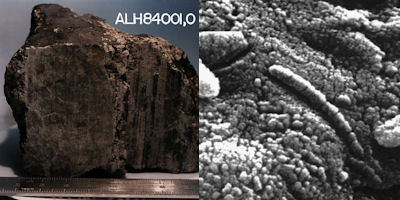Panspermia Challenged
Well, at least that's how the headline reads.
This was a cool experiment: they fastened rocks covered with both fossilized and living bacteria to the heat shield of a Russian space probe which re-entered the atmosphere. The results? The living bacteria got totally fried, but soe of the fossils came through.
So the experiment lends credence to the idea that this rock, which has been identified as coming from Mars really could have fossilized bacteria on it:

But it would appear that these results deal a harsh blow to the theory of panspermia, the idea that life was carried to earth in the form of microbes hitching a ride on meteors. I would tend to argue that the experiment confirms that re-entry is a violent and traumatic process, and suggests that if panspermia did occur, those microbes were embedded pretty deep in the meteor that brought them. It would have needed to be more than two centimeters deep, per the results of the experiment.
That sounds pretty deep, but I'm guessing that there is bacteria on this planet embedded a lot more deeply in rock than that. In fact, they should split those rocks open and see if there isn't something else living insided, something that was never intended to be part of the experiment.
Now that would be evidence for life traveling through space.



Comments
Bacteria thrive miles below the surface of earth in rocks, oil, vents, and so on. Life abides.
Posted by: Buggy | October 1, 2008 12:30 PM